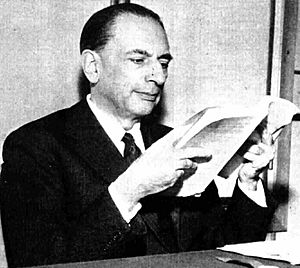Giacomo Devoto facts for kids
Giacomo Devoto (born July 19, 1897 – died December 25, 1974) was a very important Italian expert on languages. He is known as one of the greatest linguists of the 20th century. He was born in Genoa and passed away in Florence.
Contents
Giacomo Devoto's Amazing Career
Starting a Language Magazine
In 1939, Giacomo Devoto teamed up with Bruno Migliorini to start a magazine called Lingua Nostra. This magazine was all about the Italian language.
Working for European Unity
After World War II ended in 1945, Devoto helped create an organization in Florence. It was called the Associazione Federalisti Europei (AFE). This group wanted to bring European countries closer together. Later, it joined the European Federalist Movement, which was very important in 1947 and 1948.
Honors and Leadership Roles
Giacomo Devoto received many special degrees called "honoris causa" from top universities. These included universities in Paris, Basel, Strasbourg, Berlin (Humboldt), Krakow, Zagreb, and Lima. An "honoris causa" degree is an honor given to someone for their great achievements, even if they didn't study there.
He also became the President of the Accademia della Crusca in December 1963. This is a very old and important Italian institution that studies the Italian language. He was also a member of academic groups in Denmark and Finland. Devoto was also a professor of language studies and the head (Rector) of the Università degli Studi di Firenze in Florence.
Writing Famous Dictionaries
Giacomo Devoto helped write two very important Italian dictionaries. One was the Vocabolario Illustrato della lingua italiana (Illustrated Vocabulary of the Italian language). The other was the Vocabolario della lingua Italiana Il Devoto-Oli (Vocabulary of the Italian language). This second dictionary is still updated today by other experts like Luca Serianni and Maurizio Trifone.
His Work on Ancient Languages
Devoto was a leading international expert on many languages. He studied Indo-European languages, which are a large family of languages spoken across Europe and parts of Asia. His book Origini indoeuropee (1962) was about their origins. He also wrote about Latin, the language of ancient Rome, in his book Storia della lingua di Roma (1940). Of course, he also studied Italian, with books like Avviamento alla etimologia italiana (1968) and Il linguaggio d'Italia (1974).
One of his big ideas in Indo-European studies was the concept of "Peri-Indo-European." This term describes languages, places, or even groups of people that had a mix of Indo-European and non-Indo-European features. He thought of it as a rough or changed form of Indo-European. This happened when other traditions slowly changed because they came into contact with Indo-European cultures. Devoto often suggested that the Etruscan language, an ancient language spoken in Italy, was an example of a Peri-Indo-European language.
See also
 In Spanish: Giacomo Devoto para niños
In Spanish: Giacomo Devoto para niños


